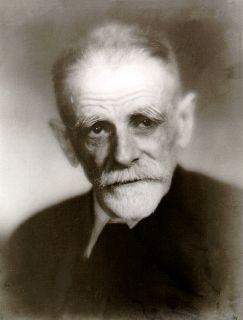Also known as:
Konstantinos Palamas, Constantine Palamas, Κωστής Παλαμάς
More People of Greece
More Topic Categories
Related Destinations
Kostis Palamas (13/01/1859 - 27/02/1943)
 Kostis Palamas was a Greek poet, author, theatre playwright, historian, and literature critic. He is considered one of the most important Greek poet and one that made a considerable contribution in the development and renewal of Modern Greek poetry.
Kostis Palamas was a Greek poet, author, theatre playwright, historian, and literature critic. He is considered one of the most important Greek poet and one that made a considerable contribution in the development and renewal of Modern Greek poetry.He was born in Patra in 1859 to parents from Mesologgi. When he was 6 years old, both of his parents died, and he was taken in the care of his uncle, along with his older brother; he stayed there until 1875 in an atmosphere of misery and sorrow, which of course greatly influenced Palamas’ psyche, as it is evidenced in his poems concerning his childhood. After he graduated from high school, he went to Athens and enrolled at the Law School of University of Athens. He soon abandoned his studies, because he wanted to be involved in literature. He started publishing poems in newspapers and magazines. Along with two friends, Nikos Kampas and Georgios Drosinis, they started collaborating with satirical newspapers, after realizing that the Athenian romanticism had declined completely; they introduced a different poetic approach, annoying the earlier poets, who described them as “fool boys” and “New School poets”.
In 1886, his first poem collection in Modern Greek was published, which was in line with the atmosphere of the New Athenian School. One year later, he married to Maria Valvi and had three children, while in 1889 he published the Hymn to Athena, dedicated to his wife, and which received an award at a poem contest. In 1896, he was already an established poet, and this is evident as he was chosen to write the Hymn of the Olympic Games. In 1897, he was appointed at the position of secretary at the University of Athens, where he remained until 1928. In 1926, he became a member of the Academy of Athens, of which he became president in 1930.
During the Greco – Italian War of 1940, Palamas and other Greek scholars cosigned the appeal of Greek scholars to other scholars worldwide, in which they criticized the Italian attack and called for a common mental revolution worldwide. Palamas died in 1943 due to a serious disease, 40 days after his wife’s passing. His funeral was written in history, as the Germans were startled by the thousands of people that were gathered, chanting the National Anthem.
Palamas was nominated for the Nobel Prize in Literature 14 times. His work is extensive both in numbers and in meaning. Mikis Theodorakis said that Palamas influenced Greece more than 10 prime ministers altogether. The interest for Palamas’ work diminished in post – War Greece, because not only did different trends in poetry emerge, but the general interest in poetry was far lower than before.
See Also:
 Athens Photos
Athens Photos
 Santorini Photos
Santorini Photos
 Crete Photos
Crete Photos
 Meteora Photos
Meteora Photos
 Corfu Photos
Corfu Photos




